Cornwall GPs follow Guru
- 3 June 2015

A patient record sharing scheme in Cornwall has gone county-wide with all GPs signed up to share their information using Microtest’s Guru.
A group of nine practices started using the clinical data-sharing tool in 2013 to give hospital and urgent care centre staff remote access to a read-only view of their GP records.
NHS Kernow CCG has now implemented Guru at all of the area’s 68 practices.
The CCG’s clinical lead for urgent care Dr Matthew Boulter said he and the group’s chair had been becoming increasingly frustrated that despite enormous effort and plans put in place by GPs to keep people out of hospital, patients would often be admitted over the weekend when practices are shut.
Two years ago they started a project involving practices in West Cornwall to test the idea of sharing their data with hospital clinicians.
Boulter spent a long time working with GPs on access and consent issues and talking to Microtest about their requirements.
They agreed that clinicians must ask patients at the point of care if they can access their shared care record and a weekly audit report is sent to practices, showing who accessed what records and for how long.
Each practice decides what level of records access to grant to different types of health professionals using a tick box system.
Boulter said it was about six months before his practice received an alert that a patient record had been accessed, but since then usage has been building.
“It was a slow grower because it involved behaviour change, but a couple of hospital doctors started to get it and became internal champions,” he told Digital Health News.
Anecdotal evidence from hospital staff is that they are regularly saving admissions by using Guru.
“Now it’s almost the default thing to do, to ask the patient to access their records and get a picture of what’s going on,” Boulter said.
West Cornwall Hospital medical director Dr Neil Davidson described Guru as a huge success story.
“Patients often arrive by ambulance and can be very sick and may often forget to tell us many things about their medical history and medication. What I like about Guru is that it provides immediate access to patient records and is intuitive and very simple to learn,” he said.
“Almost every day I have a ‘success story’. We were able to treat someone straightaway as we had access to an ECG on her GP patient record. It is saving us time and it is often the sickest patients who benefit the most.”
Iain Davidson, chief pharmacist at Royal Cornwall Hospital Treliske, said the system saves ten minutes per medicines reconciliation. As 1,500 are done every month, this saves considerable time and improves patient safety.
“Before Guru we would have to contact a patient’s practice for a copy of a patient’s record, but this was a problem during evenings and weekends when practices were closed,” he said.
“Guru gives us remote electronic access to patient records 24-hours a day, to help us with medicines reconciliation.”
Boulter said there are plans to expand Guru access to the ambulance service.




